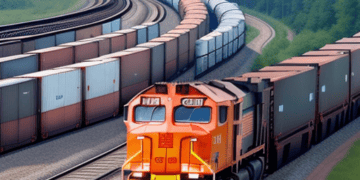OMAHA, Neb. — Concerns are rising among unions and regulatory bodies regarding the potential impact of recent layoffs within the freight rail industry, especially against the backdrop of an investment fund’s campaign for control over Norfolk Southern. These concerns highlight the tension between operational efficiency and safety protocols, accentuated by the adoption of a lean operating model by major freight railroads. This model, which has led to significant workforce reductions, utilizes fewer, longer trains requiring less manpower and equipment. Although the railroads assert this strategy does not compromise safety, service quality notably declined in 2022 following aggressive cuts during the pandemic.
The focus on short-term financial gains, according to Martin Oberman, chairman of the Surface Transportation Board, may detract from long-term investments crucial for safety and service sustainability. This stance reflects broader apprehension regarding investor pressures on rail companies like Norfolk Southern and Union Pacific, potentially hindering efforts to enhance rail infrastructure resilience and growth. Ancora Holdings, challenging Norfolk Southern’s leadership, claims its proposed management team is committed to maintaining safety standards without resorting to extensive layoffs, instead advocating for workforce optimization through attrition. Ancora emphasizes its candidates’ track records in prioritizing community and employee safety alongside operational excellence.
The debate has drawn in major rail unions, supporting Norfolk Southern CEO Alan Shaw’s safety improvement measures post the East Palestine, Ohio derailment. Meanwhile, other railroads, like BNSF and Union Pacific, face scrutiny over layoffs attributed to shifting work to busier terminals and seasonal adjustments, respectively. These layoffs have sparked union concerns about the railroads’ ability to maintain necessary safety inspections and repairs. Union leaders and labor coalitions are urging federal oversight to ensure safety standards are not compromised by workforce reductions. They argue that profit-driven strategies risk undermining rail safety and service quality. In response, railroad representatives and CEOs maintain their commitment to safety, challenging the notion that operational decisions are made at the expense of safety protocols.
As the industry navigates these challenges, federal safety statistics reveal mixed outcomes, with slight reductions in derailments but an increase in main track accidents. This underscores the ongoing need for balancing operational efficiency with safety and service commitments in the freight rail sector.
Get the latest supply chain report news insights at The Supply Chain Report. For international trade resources, visit ADAMftd.com.
#InvestmentImpactNews #UnionActionNews #RailroadLayoffs #RailRegulationNews #LogisticsSector















